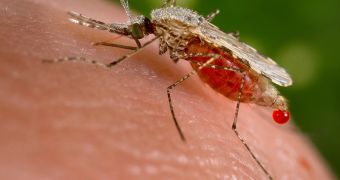A group of investigators in the United States announces the discovery of a new mechanism of the immune system that fights against the malaria parasite during the earliest stages of infection. By boosting its activity, it may be possible to develop treatments that do not allow the condition to take hold in the human body in the first place.
Conducting this type of studies on humans is a very complex task, so researchers used lab mice as animal models. However, this presented a challenge in itself, since the Plasmodium falciparum parasite that causes malaria is uniquely adapted to every host it infects. This means that results obtained by studying mice are not necessarily relevant to humans, too.
The research group, led by investigators at the Massachusetts Institute of Technology (MIT), in Cambridge, circumvented this issue by genetically engineering a new strain of mice, whose immune systems are very similar to our own. This means that results obtained while analyzing them are translatable to humans as well.
A study of this special animal population led researchers to conclude that natural killer cells (NK cells) in the immune system, a type of cytotoxic lymphocytes, play an important role in keeping P. falciparum under control, at least during the first two days of infection.
The team decided to study how NK cells and another type of immune system cells, called macrophages, attack the parasite. In mice whose macrophages had been totally removed, experts noticed no changes in infection spread patterns.
In mice whose NK cells were removed, the team found that the parasite infected the host up to 700 percent faster. This discovery suggests that NK cells play a role in stopping the early spread of infections, and suggests that these cells are eventually overrun by P. falciparum.
“These findings will prompt future studies in infected humans and suggest that augmenting NK cell function might provide a new therapeutic strategy for malaria,” comments University of California in San Francisco (UCSF) microbiology and immunology professor Lewis Lanier, who was not involved with the research.
Additional results of the study appear in this week's early online issue of the esteemed journal Proceedings of the National Academy of Sciences (PNAS). The research group also included experts from the Carnegie Mellon University and the Nanyang Technology University, in Singapore.

 14 DAY TRIAL //
14 DAY TRIAL //